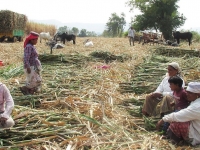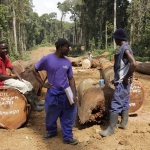PepsiCo Rejects Shareholder Resolution on Exploitation of Female Sugarcane Workers in India

Photo: Parth M.N., People’s Archive of Rural India. Used under Creative Commons license.
PepsiCo refused to allow a shareholder resolution requesting the company look into allegations that it is buying sugar from female farm workers in Maharashtra, India, who are coerced into undergoing hysterectomies. The resolution was filed following an exposé by the Fuller Project and the New York Times.
BNP Paribas Asset Management and Mercy Investment Services, among others, filed the shareholder resolution in November 2024, asking PepsiCo to detail the “effectiveness of PepsiCo’s efforts to uphold its human rights standards throughout its sugar supply chain in India.” Had the company accepted the resolution, it would have been discussed at its annual general meeting on May 7th, 2025.
However, in February 2025, the company asked the U.S. Securities and Exchange Commission (SEC) to allow it to reject the resolution on the grounds that the request related to operations valued at under five percent of its assets, net earnings, and gross sales under a 2025 rule change that allows companies to request permission from the SEC to take "no action" on resolutions that are not “significantly related” to the company’s business.
Despite the rejection of the shareholder resolution, the company has not denied multiple in-depth reports from Indian newspapers and reputable non-profit organizations like Oxfam that sugar produced by workers in Maharashtra is indeed used to sweeten beverages made by international food conglomerates like PepsiCo as well as products made by Coca-Cola, Mondelēz, Nestlé and Unilever.
Pepsi products in India are made exclusively by Varun Beverages, based in Haryana, which operates bottling plants across India, including in Maharashtra—one of the largest producers of sugar in the country.
The core of the human rights abuses borne by the workers (who are mostly migrants from middle, lower and lowest castes) in Maharashtra lies in the district of Beed, a poor rural region.
Every autumn before the harvest begins, sugar mill owners pay private local contractors known as mukadam (the word means labor foreman) to Beed to recruit workers. Over 1.5 million migrants—men, women and children—travel from one field to the next during the cutting season that spans October to March in search of job opportunities.
These workers often have to live in tents by the fields and the sugar mills because the cane has to be transported to the mill as soon as it is cut, otherwise it loses value. The women wake up as early as four in the morning every day to draw and carry water, build a fire, boil tea, cook lentils and vegetables for their meals and wash clothes in a basin, before beginning work shifts that sometimes last until midnight. Once the sugar has been harvested from a field, the workers move to the next location, hauling their belongings with them.
To cut costs, mill contractors take advantage of an informal system of married couples working together called koyta that is unique to the region. (The word koyta is derived from the Marathi word for a sickle used to cut sugarcane.) The couples are given an advance for the season—sometimes as much as 150,000 rupees (US$1,800) per couple—instead of proper wages, in exchange for delivering a set weight of cane for the season. (This works out to approximately US$5 a day per worker per day, but often less.)
The cash-up-front is a huge incentive for parents to press girls as young as 12 to enter into illegal child marriages (the legal age of marriage is 18 for women). Weddings are sometimes conducted at the sugar mill gates so that children can be put to work immediately.
“On any given day, these women make bundles of sugarcane, weighing up to 50 kilograms at a time, carry them on their heads and climb up the stairs to load them onto a truck,” Trupti Malti of Mahila Kisan Adhikaar Manch (Forum For Women Farmers' Rights), told Atmos, a nonprofit media organization. “It puts severe pressure on their bodies and it isn’t unusual for them to suffer from aches and pains.”
“There are no bathrooms and toilets. It becomes even more difficult for a woman if she has periods in these conditions,” Vilabai, a worker in her 70s, told the Hindu Business Line newspaper.
“We are expected to work for 14 hours, even when we are sick and even on our monthly periods,” Bhanubai Madhulkar Shinde, a sugarcane cutter in her 30s who underwent a hysterectomy, told Atmos.
Because period supplies can be expensive, difficult to find and hard to dispose of, girls and young women feel pressured to seek hysterectomies, a surgical procedure that removes their uterus, in order to continue working, unburdened by menstruating in a field under intense heat without access to sanitation or shelter.
“Period pain or pregnancy means more missed days and more lost wages. While contractors may not physically force them to undergo hysterectomies, they create conditions that push women into it. For many who have already had children, it feels like the only way to keep working,” Manisha Vaijnath Tokle, a labor rights activist in Beed who helps rescue workers from bonded labor, told the Guardian newspaper.
Hysterectomies carry short-term risks of abdominal pain and blood clots as well as premature menopause and long-term risks of heart disease, osteoporosis and other illnesses.
“In the cane cutter community, menstrual periods are considered a problem and they think surgery is the only option to get rid of it. But this has a serious impact on the health of the women as they develop a hormonal imbalance, mental health issues, gain weight etc. We observed that even young girls at the age of 25 have undergone this surgery,” Achyt Borgaonkar of Tathapi, a women's rights organization in Maharashtra, told the Hindu Business Line.
Indeed, local government surveys suggest that between one-fifth and one-third of female sugarcane workers from Beed had opted for hysterectomies, at a rate that is as much as ten times greater than the Indian national average rate of 3 percent.
“These are villages of womb-less women,” Manda Ugale, a sugarcane worker, told the Hindu Business Line.
The workers are also beholden to the contractors who track how much cane they have cut in return for the cash advance. But since the sugarcane mills do not issue official contracts or records, the labor foremen often claim that the workers have failed to meet their obligations and require them to return season after season.
To make matters worse, most of the sugar mills are owned by politicians who are profiting from their own constituents’ exploitation instead of protecting them.
The Fuller Project and the New York Times’ investigation showed that leadership over Maharashtra's sugar mills includes at least 21 state lawmakers, four members of the national Parliament, five government ministers and almost 50 former government officials. Mill owners hail from nearly every side of the political aisle and include the ruling Bharatiya Janata Party, Indian National Congress, Shiv Sena and National Congress Party.
Mill bosses assert that because intermediary contractors recruit sugar workers, they are off the legal hook. Meanwhile, the contractors say that they have no control over the labor conditions because the cash advances come from the mills. This endless finger-pointing and blame-shifting is “to evade the clutches of these labor laws,” Shekhar Gaikwad, Maharashtra’s former top sugar regulator, told the Fuller Project and the New York Times.
After the investigative stories were published in 2024, PepsiCo pledged to assess the alleged labor abuses, albeit without disclosing any details on what steps would be taken. “The description of the working conditions of sugar-cane cutters in Maharashtra is deeply concerning,” PepsiCo said in a statement. “We will engage with our franchisee partners to conduct an assessment to understand the sugar-cane cutter working conditions and any actions that may need to be taken.”
However, some change is on the horizon.
In March 2025, the Bombay High Court ruled that the koyta system was illegal, that middlemen contractors who recruit migrant workers must be registered as employers and that the government needed to address the problems affecting sugarcane cutters. The court also ordered that workers be provided access to clean water, electricity, sanitation facilities and cooking gas.
“This is a historic moment, a historic opportunity where the court has pushed to make substantial changes,” Chandan Kumar, a labor leader with the India Sugar Industry Workers Association, told the New York Times. “The legal system has legitimized all of our demands.” Government bodies are expected to issue a compliance report by November 2025.
Meanwhile, Brad Lander, the New York City comptroller, who oversees pension investments, recently called on major sugar buyers to stop profiting from the exploitative labor system in Maharashtra. The city’s pension funds own almost $1 billion in stock in PepsiCo and other companies. In addition, the U.A.W. Retiree Medical Benefits Trust, a $60.5 billion pension fund, signed a letter urging companies to improve labor conditions in Maharashtra sugar mills.



